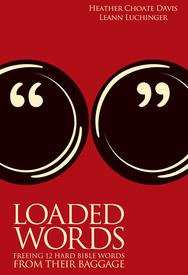
I met Heather Choate Davis and Leann Luchinger at a conference. We traded books and talked about historical theology. It was a great way to pass the time at an event where none of us fit in. At all.
They told me about the book they were working on: Loaded Words: Freeing 12 Hard Bible Words from their Baggage. I thought it sounded really cool, so I conned them into giving me a free copy in exchange for a review.
They became a writing team in seminary. They already had a lot in common. Both were Lutheran and had extensive careers in marketing. And both had a huge love of words in all their power and all their problems. And they really loved the Bible.
So, accomplished writers and business professionals that they were, they set up an online hub for their interrelated ministries of writing, and teaching, and renewal of the Church. They called it “Icktank“; that’s short for “Ichthus Think Tank.”
Clever, thoughtful words.
So their book is something I really want to tell you about. Whether you have seminary degrees like Leann and Heather or not, what they do in these twelve chapters is a great model for life-giving study of Scripture.
In each chapter they take a word that is significant to the Christian faith. A word that is, as they put it “loaded.” A word that is laden with baggage from our culture’s and from Christians’ misuse over the centuries. Words like “sin” and “saved.” Words like “religion” and “Christian.”
They ruminate over each word with loving care, looking at its use in the Old Testament and the New, exploring the Hebrew and Greek terms that get translated into familiar English terms. They listen for the resonances of the word in our current world, for the ways the word has become problematic or useless or misleading over the centuries.
And they try to give the word back to us, with an understanding of its original meaning. And it is always a helpful meaning, something that is part of living faith; something that is part of life in Christ shorn of the death-dealing baggage.
If you pick up a copy, you may not always agree with where they take the words the explore. But let your disagreement move you to explore the Bible’s use of the word for yourself. Heather and Leann’s essays can be great fodder for your own inner conversation with God through Scripture.
And take their example to heart. Find the biblical words you think are heavy with baggage or heavy with meaning. Then explore those words, tracing them through the Bible with a concordance or on a site like Bible Gateway.
Do as they did and see how the use of the word changed over time from early in Genesis to late in Revelation. Follow their example and listen for ways Paul used a term differently from Jesus.
This is what I was trying to describe in the chapter on “reading” (better termed “studying”) in my book, Love Your Bible, on classical lectio divina.
If I were to make recommendations for the second edition of Loaded Words, the most important would be to be more explicit about the “story” told by the twelve words selected and the order in which they are presented. There is a message there, and the book would be a more engaging read if the connections were made clear.
My other recommendation has to do with the study questions included in the book. Every chapter has a page or so of questions for reflection, and this has the potential to make the book more useful, both to individuals and church groups. Too many of the questions are essentially factual, asking what was said on a topic on a particular page, or asking for simple “yes” or “no” responses. The questions would invite richer reflection, whether as individual journaling or group discussion, if they stated a key point and asked the readers to imagine implications or otherwise take the idea further.
————
I’d love to hear from you in the comments: If you were going to write a book like Loaded Words, what words would you want to include–and why?

Leave a Reply